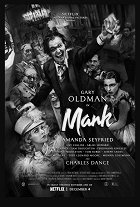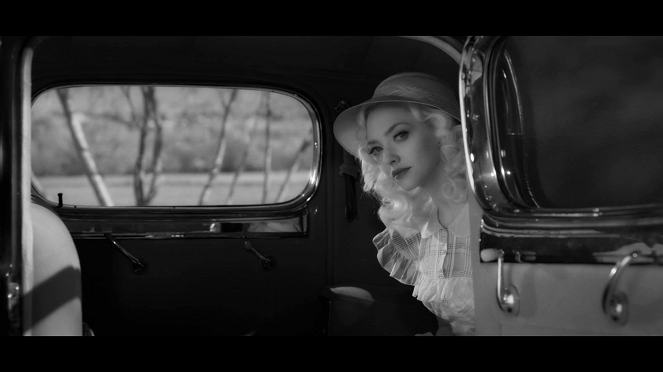Directed by:
David FincherScreenplay:
Jack FincherCinematography:
Erik MesserschmidtCast:
Gary Oldman, Amanda Seyfried, Lily Collins, Charles Dance, Tom Burke, Joseph Cross, Tuppence Middleton, Leven Rambin, Tom Pelphrey, Arliss Howard (more)VOD (1)
Plots(1)
1930s Hollywood is reevaluated through the eyes of scathing wit and alcoholic screenwriter Herman J. Mankiewicz as he races to finish Citizen Kane. (Netflix)
Videos (2)
Reviews (14)
This year, David Fincher gave me an early Christmas present in the form of a 100% movie-lover experience, thanks to which I was lost for two hours in the Hollywood machinery and political jungle of the end of the 1930s and start of the 1940s. Jack Fincher's screenplay flows harmoniously like a poem and there are strong intense speeches from the characters that I haven't heard in a movie for a long time. Cult movie making maybe, but absolutely breathtaking and shot right from the heart!
()
David Fincher is one of the greatest directorial aces and has long since established a position where we know that anything he makes will be at least interesting, and Mank is no exception. However, I suffered quite a bit as a viewer with it. This trip to 1940s Hollywood is no doubt a good film, and the depiction of the era, the politicking of the studios, and the life of a screenwriter who, though he drank a lot, could be all the more honest, is definitely worth watching, even if I was bored from the halfway point on. All those objective and technical qualities I can understand and subscribe to, Fincher knows what he's doing and he does it damn well. It's just that this time he didn't hit the mark for me in theme or indeed form. I simply didn't enjoy watching his new film. And he didn't want to make it any easier. Great atmosphere, a perfect Gary Oldman, great sets and music, but behind all that is the all-too-ordinary story of an all-too-ordinary man. I expect something more progressive from Fincher. Maybe, since he was directing his late father's script, he wanted to keep himself a little bit in check. I could understand that, but I'm not sure it was worth it.
()
A sea of name dropping, perfectly executed visuals, but emotionally speaking, Mank only barely whispered to me here and there, rather than speaking to me coherently. It is the completion of a homework assignment for me and David Fincher, saved from downfall primarily by its unintentional thematic relevance.
()
Mank attracts viewers primarily through its unraveling of the tangle of influences that led the title character, an alcoholic screenwriter, to write the celebrated Citizen Kane. However, the actual writing of that screenplay plays second or rather third fiddle in Mank, as there is no depiction of the classic’s shooting, the great Tom Burke as Orson Welles appears on screen for a total of maybe three minutes, and Mank isn’t very faithful to the historical facts; for example, it presents Welles’s involvement in the drafting of the screenplay in accordance with myths that have long since been debunked. In fact, Mank is rather generally focused on the workings of Hollywood in the 1930s and during the Great Depression, and to roughly the same extent it deals with the political mood of the time and the affair involving the 1934 California gubernatorial race, which is understandably not much of a draw for viewers. But that’s not the problem. Rather, the problem is that none of this is rendered in a very engaging way. Though I fully understand Fincher’s desire to make a film based on his father’s long-shelved screenplay, that screenplay is unfortunately about uninterestingly written and poorly defined characters who frequently deliver witty and precisely aimed lines, but what good is that when there is no one to build any kind of relationship with on the screen? Furthermore, the second half of the film fundamentally loses traction and, with the exception of a drunken scene at a fancy-dress dinner party, it doesn’t contain much that’s remarkable. Tim Burton's Ed Wood, for example, was made with a similar intention and turned out much better. Mank is also related to Citizen Kane in its attempt at an audio-visual retro-form, which, though impressive, is not in any way consistent (after all, it was shot in widescreen digital), with a complicated narrative structure full of flashbacks (which are rather oddly skipped between in places) and a lot of different allusions (visual quotes, references to sleds and rosebuds, for example). Therefore, it is definitely necessary to see Citizen Kane before watching Mank. And though it’s fortunately not entirely necessary, it helps to know something about the key figures of Hollywood society at the time.
()
Like Nolan, Finch this year has taken on an overwrought variation of his fetish beyond the parameters of viewer-friendly cinema. Mank is his Grand Hollywood Retro-Spectacle. Or rather his now-deceased dad, who was born during the period depicted and whose screenplay was sitting in David’s drawer, waiting for the benevolent Netflix. The enchantment of the visionary entrepreneurialism of the Hollywood studio bosses, high-society parties and debates in the opulent halls of luxury mansions, and an intimate portrait of a gifted screenwriter who was more of an outsider alcoholic despite his eccentricity and constant presence in the circles of kindred professionals. Though all of this may sound wonderful and appealing (and it’s also incredibly authentically executed cinematically), the result is problematic. Fincher interweaves the film’s world with the politics of the given setting and period, which viewers aren’t interested in, jumping around in time and between characters that he says little or nothing about and, in the dishevelled narrative, only barely manages to concentrate on the motivations of the main character, whom the whole film is supposed to be about. It is wonderfully entertaining in some individual aspects (a visit to the studios and an exterior set) and evokes a mature creative cleverness, but elsewhere it is boring with its pointlessness and empty dialogue. The character of William Hearst (Charles Dance), who was supposedly Mank’s inspiration for writing Citizen Kane, is sidelined here and no intellectual parallel is drawn between Welles’s and Fincher’s films. The moods, poses and opinions that are stuffed into this evidently artistically ambitious work will certainly please a few academics, historians, film buffs and political scientists all rolled into one, but I prefer the more narratively refined and stimulating pieces in this mold – whether the cynically intellectual (Altman’s The Player) or simply heartfelt (Burton’s Ed Wood). Of the actors, Arliss Howard comes closest to earning an Oscar for his excellent portrayal of L.B. Mayer. The walk around MGM with his emotive monologue is one of the movie scenes of the year. “This is the business where the buyer gets nothing for his money but a memory. What he bought still belongs to the man who sold it. That’s the real magic of the movies.”
()



Ads